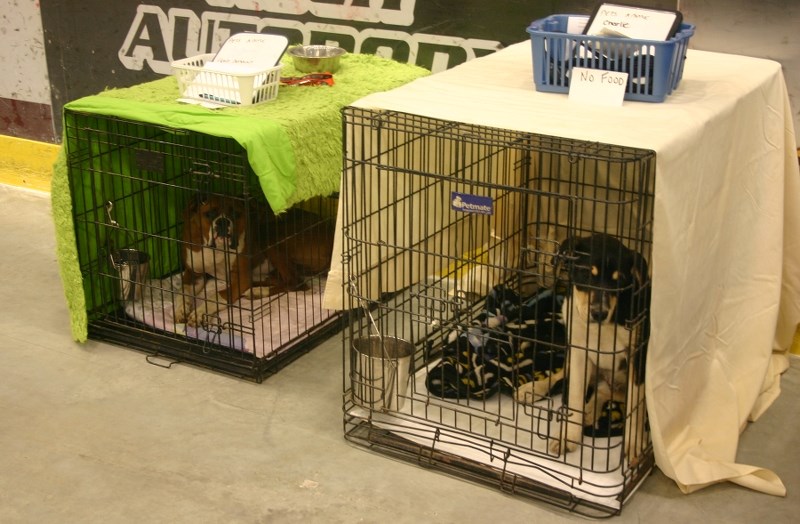The communities of Calling Lake and Athabasca definitely rose to the challenge of hosting around 4,000 evacuees from Wabasca early last week.
At 3 p.m. May 23, a wildfire that had been threating the hamlet of Wabasca jumped a fire barrier. Residents and those in the surrounding area were given a few hours to evacuate. Later that evening, the evacuation was made mandatory and the Municipal District of Opportunity declared a state of emergency.
“We were the main registration and they're finalizing the numbers now, but we (had) over 3,000 (evacuees),” said Angela Lightning, spokesperson for the Calling Lake Reception Centre. “Some people were registering, but they were just going through because they had other options.”
With evacuees staying in the reception centre and the surrounding area, the population of Calling Lake doubled and its residents stepped up to help.
“We probably had at least 100 volunteers (and) there were lots from around here,” said Lightning. “I'd say 50 per cent or more were from around here, and we had lots of people in from Bigstone (Cree Nation).”
Others came in from as far away as Edmonton with truckloads of supplies to help.
“We had lots of people volunteering,” she said. “I think you just see an urgency. You see the people suffering. Human nature kicks in.”
This was the first time Calling Lake has played host to evacuees and Lightning said things went well — especially, she said, after they got things organized. The first 48 hours were spent just reacting and filling needs.
“It took us until after the 48 hours to get organized,” she said. “The first 48 hours were really crucial, but I think once we got delegated … everything was starting to fall into place.
“People were so patient,” she added. “They were really good people that we had.”
Following this experience, Lightning said the next step is to get an emergency plan drafted for Calling Lake.
“We've taken some training for disaster response, but you don't really get the training until you're in it. So, we're going to be doing our debriefing and starting planning accordingly.”
Things went a little smoother in Athabasca, but they’d had their trail by fire during the 2011 Slave Lake evacuation.
“We did have a very good plan in place and awesome staff to activate the reception centre and facilitate it,” said Ron Jackson, spokesperson for Athabasca County. “There were good lines of communication (and) we knew what needed to be done.”
Unlike in the Calling Lake Reception Centre, there was no real need for donations or volunteers in Athabasca. Instead, they mostly relied on the volunteer list that Family and Community Support Services (FCSS) provided and the items they already had.
“If the event would've gone on for another two, three, four days, that would've been a different story,” Jackson said. “We probably would've imposed upon the community for helping out with everything from clean-up to cooking to running the reception desk.”
However, that didn’t stop some people and businesses from stepping up and helping the evacuees. Vicki Ruminski-Stafford of Sammy’s Pet Boarding, for instance, looked after 27 dogs and cats for the duration of the evacuation.
“I just feel like it's important to ensure that the pets are looked after during something like this,” she said. “It can take a lot of stress off of the owners and stress off of the pets if they're kept in more of a confined area that's a little bit more controlled.”
Having assisted during the Slave Lake fire, Ruminski-Stafford had experience caring for evacuees’ pets. This time, she said, things went much more smoothly for her.
“There was a significant difference between this time around and the Slave Lake time. It was definitely a smaller scale this time. We were much better organized. It was a much calmer this time in the animal care area.”
There are a couple things she would like to change if it happens again, but, “I think we’ve got it down pretty pat.”
The Athabasca and District Chamber of Commerce also helped, joining the organizations that made meals for the evacuees.
On Wednesday they were supposed to have a Mayors and Reeves Breakfast, but they cancelled it because of the evacuation. Instead, they used the equipment and the money they had already raised towards making the breakfast for the evacuees.
“The Chamber, as a bunch of business leaders in the community, we're very proud to be a part of a whole bunch of people who stepped up with the evacuees,” said Todd Dutchak, the chamber’s president. “If something like this every happens again, which we hope it doesn't, we'd be more than willing to step up with the other volunteers again.”
They, along with many other individuals and organizations, even drew praise from the provincial government.
“The volunteers and the local businesses here have once again proven that Athabasca is really capable of so much in a situation like this,” said Kim Capstick, a provincial spokesperson. “People just stood up and stepped up, and it's just absolutely phenomenal to watch.”



